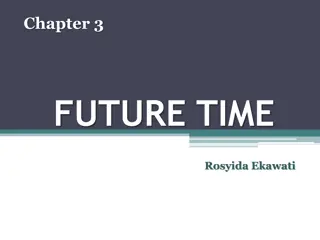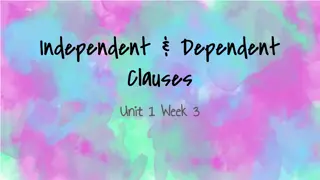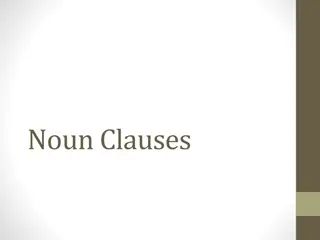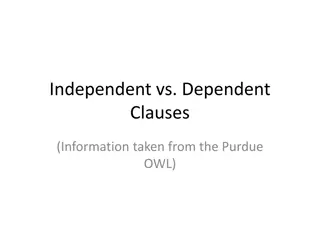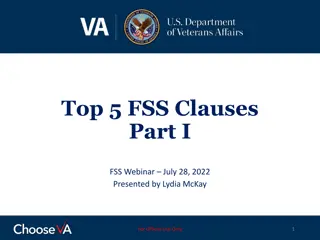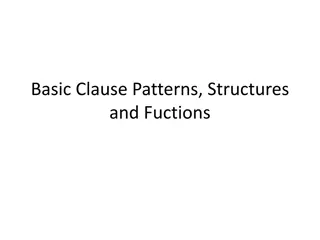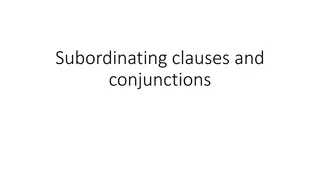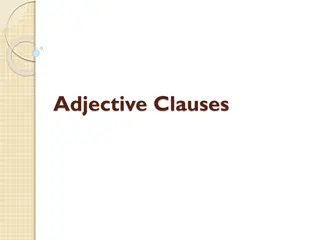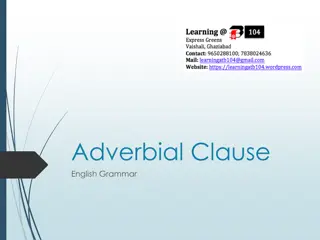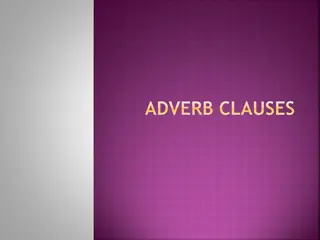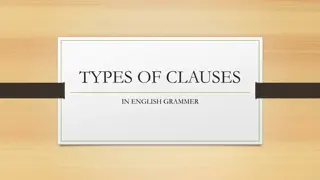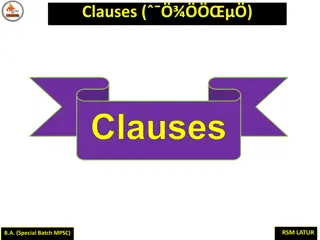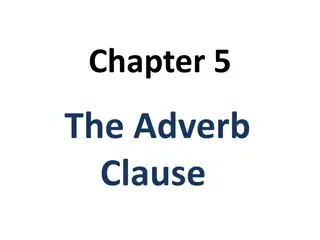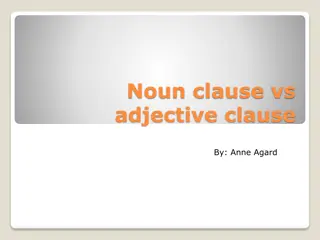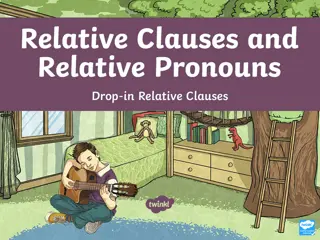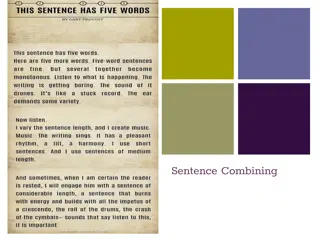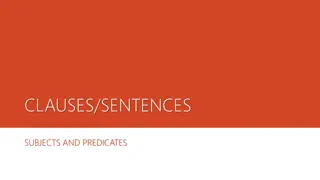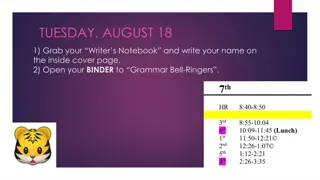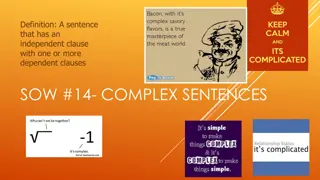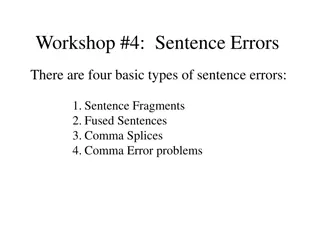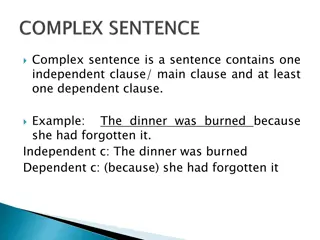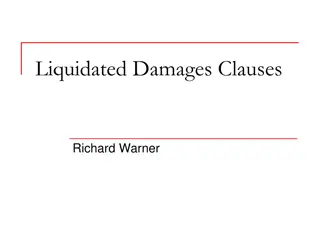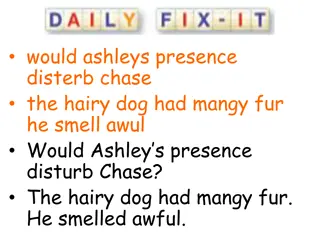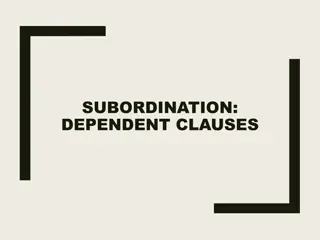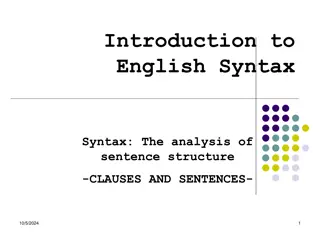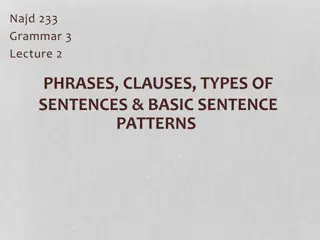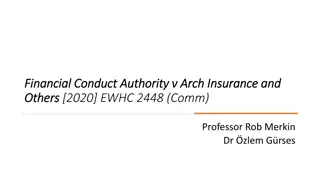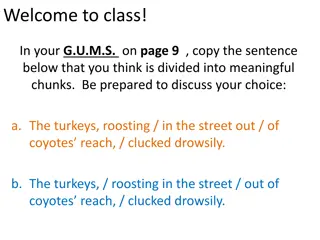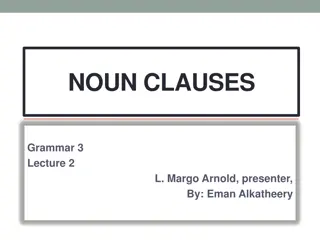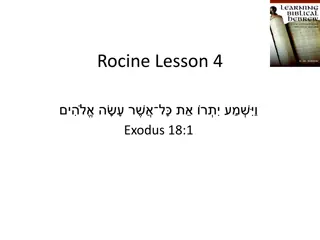Understanding Embedded Clauses in Writing
Explore the use of embedded clauses in writing through examples and practice exercises. Learn to identify main and subordinate clauses, conjunctions, and create sentences with fronted adverbials. Enhance your writing skills by understanding the structure and function of embedded clauses.
0 views • 12 slides
Understanding Phrases, Clauses, and Expressing Future in Time Clauses
Learn about the difference between phrases and clauses in sentences. Understand how clauses can be independent or dependent, and how time clauses are used to express future actions. Discover the rules around constructing time clauses and their significance in sentence structure.
5 views • 14 slides
Understanding Independent and Dependent Clauses
An independent clause contains a subject and a verb, forming a complete sentence on its own, while a dependent clause also has a subject and a verb but cannot stand alone. Dependent clauses rely on independent clauses to form complete sentences and are introduced by subordinating conjunctions. When
0 views • 4 slides
Understanding Noun Clauses in English Grammar
A clause is a group of words with a subject and a verb, while a phrase lacks one. Independent clauses can stand alone, while dependent clauses cannot. Noun clauses function as nouns in a sentence, serving different roles like subjects, objects, prepositional objects, and complements. They can start
1 views • 49 slides
Understanding Independent vs. Dependent Clauses
Independent clauses express complete thoughts and can stand alone as sentences, while dependent clauses require an independent clause for support. Learn about coordinating conjunctions, comma splices, and run-on sentences to enhance your understanding of sentence structure. Avoid common errors by re
1 views • 10 slides
Understanding Top 5 FSS Clauses for Federal Supply Schedule Contracts
This training session delves into the crucial FSS contract clauses that impact compliance and management. Learn about key clauses like minimum contract sales criteria, cancellation authority, and trade agreements requirements. Discover how these clauses can affect offerors and contractors, guiding y
0 views • 39 slides
Understanding Basic Clause Patterns and Structures
Explore the core concepts of clause patterns, structures, and functions, including independent and dependent clauses, sentence types, compound sentences, and conjunction usage. Learn about the components of a clause, how to identify independent clauses, and how they can be linked to form compound se
2 views • 38 slides
Understanding Subordinating Clauses and Conjunctions through Examples
Explore the concept of subordinating clauses and conjunctions by analyzing sentences with conjunctions like "when", "after", "if", "once", and more. The examples showcase how these clauses connect dependent and independent clauses to enhance sentence structure and meaning. Gain insights on using sub
1 views • 6 slides
Understanding Adjective Clauses in English Grammar
Adjective clauses, also known as relative clauses, are dependent clauses that act as adjectives in sentences. They modify nouns, pronouns, or entire sentences and begin with a relative pronoun. This article explains how adjective clauses function, provides examples, and discusses the use of pronouns
1 views • 62 slides
Understanding Noun Clauses in English Grammar
A clause is a group of words with a subject and verb, while a phrase lacks one. Noun clauses, functioning as nouns, serve various roles in sentences. They can be subjects, objects of verbs/prepositions, or complements. Starting with question words like what, when, or why, these clauses mirror statem
0 views • 49 slides
Understanding Adverbial Clauses in English Grammar
Adverbial clauses in English grammar serve as adverbs to modify verbs, providing information about time, place, cause, contrast, condition, purpose, result, and manner. By exploring the types of adverb clauses, subordinating conjunctions, and examples, you can enhance your understanding of how adver
0 views • 10 slides
Understanding Adverb Clauses: Usage and Examples
Adverb clauses help to establish relationships between ideas by indicating time, cause and effect, contrast, and condition. They are dependent clauses that must be connected to a main clause. Punctuation plays a key role in distinguishing between adverb clauses that precede or follow a main clause.
0 views • 43 slides
Understanding Types of Clauses in English Grammar
A clause is a fundamental unit of a sentence, comprising a subject and predicate. Learning about the different types of clauses - Independent, Dependent, Relative, and Noun clauses - helps in enhancing grammar skills and sentence structure understanding. Independent clauses stand alone as complete s
2 views • 11 slides
Understanding Clauses and Their Types in English Grammar
This comprehensive guide explores different types of clauses in English grammar, including main clauses, subordinate clauses, independent clauses, adverb clauses, noun clauses, and adjective clauses. It delves into the functions of clauses as subjects, objects, complements of verbs, objects of prepo
2 views • 11 slides
Understanding Adverb Clauses: Types and Examples
Adverb clauses are dependent clauses that function as adverbs to modify the main clause's verb. They are connected by subordinating conjunctions and come in types like time, condition, cause, effect, and contrast. Adverb clauses of time detail when actions occur, while examples showcase how they mod
5 views • 7 slides
Understanding Adjective Clauses and Noun Clauses in English Grammar
Learn the key differences between adjective clauses and noun clauses in English grammar. Adjective clauses describe nouns, while noun clauses take the place of a noun in a sentence, serving as either the subject or object of a verb. Discover how to identify and use these clauses effectively through
0 views • 10 slides
Understanding Relative Clauses and Pronouns
Utilize relative clauses to provide additional information to a noun, using relative pronouns such as who, which, where, when, and whose. Learn how to construct complex sentences with at least two clauses, ensuring the subordinate clause complements the main clause. Explore examples and practical st
2 views • 14 slides
Understanding Sentence Structure: Phrases, Clauses, and Compound Sentences
Learn about phrases, clauses, simple sentences, conjunctions, and compound sentences in English grammar. Understand the differences between independent and dependent clauses, how to form compound sentences using conjunctions, and practice writing sentences about Justin Bieber. Explore the components
1 views • 21 slides
Understanding Phrases, Clauses, and Sentence Structures in Grammar
Learn about phrases and clauses, differentiate between independent and dependent clauses, identify subordinate conjunctions, and practice annotating sentences for independent and dependent clauses. Improve your grammar knowledge with examples and guided practice exercises from Perry High School's Gr
2 views • 67 slides
Understanding Clauses of Purpose in English Grammar
Clauses of purpose in English grammar are used to explain the reason behind an action or event. They can be introduced in various ways such as full infinitive, in order to, so as to, so that, among others. These clauses serve the purpose of clarifying the intentions or outcomes of a particular actio
3 views • 11 slides
Understanding Clauses, Sentences, Subjects, and Predicates
Learn about the essentials of clauses, sentences, subjects, and predicates through examples and explanations. Understand the importance of having a subject and verb in a sentence, identifying fragments, and connecting dependent and independent clauses. Enhance your knowledge of grammar fundamentals.
1 views • 8 slides
Understanding Clauses and Phrases in Grammar Practice
Explore the world of clauses and phrases with clear explanations and practice exercises. Enhance your grammar skills by identifying dependent and independent clauses, learning how they function in sentences. Dive into creating trading cards for character analysis, integrating language arts and creat
1 views • 5 slides
Understanding Grammar: Clauses in Sentences
A clause is a fundamental part of a sentence that comprises a subject and a verb. A clause can either stand alone as a sentence or be dependent on a main clause. Independent clauses can function independently, while dependent clauses rely on main clauses for context. Examples and explanations help c
0 views • 28 slides
Understanding Complex Sentences in English Grammar
Complex sentences consist of an independent clause along with one or more dependent clauses. The independent clause can stand alone, while the dependent clauses rely on the independent clause for meaning. Differentiating between independent and dependent clauses is essential in understanding how com
0 views • 15 slides
Understanding and Avoiding Sentence Errors
Learn about the four basic types of sentence errors - sentence fragments, fused sentences, comma splices, and comma error problems. Understand the difference between phrases and clauses, and how to avoid sentence fragments by combining phrases or dependent clauses with independent clauses. Discover
1 views • 12 slides
Understanding Clauses in English Language
This informative presentation delves into the concept of clauses in the English language, covering topics such as types of clauses (independent, subordinate, noun), definitions, examples, and how to combine sentences using clauses. Exploring the basics and intricacies of clauses can enhance your und
0 views • 17 slides
Understanding Complex Sentences and Clauses
Complex sentences consist of an independent clause and at least one dependent clause, such as adjective, adverb, or noun clauses. They are connected using subordinate conjunctions, relative pronouns, and relative adverbs. Each has a specific role in modifying nouns, pronouns, verbs, adverbs, or conn
0 views • 14 slides
Understanding Liquidated Damages Clauses in Contracts
Liquidated damages clauses serve to determine a precise amount of damages in case of contract breach when actual damages are difficult to ascertain. Courts enforce such clauses if they meet certain criteria based on reasonability and proportionality. Historical hostility towards these clauses has le
0 views • 17 slides
English Grammar Final Exam Review
Subordinate clauses, nominal phrases, and noun clauses are identified within the context of adjectival, adverbial, or nominal functions. The exercise covers recognizing nominal clauses following prepositions as noun phrases, pronouns, gerunds, or nominal clauses. Additionally, combining sentences us
0 views • 17 slides
Understanding Types of Sentences in English Grammar
Types of sentences in English grammar include clauses - independent and dependent. Independent clauses stand alone, expressing complete thoughts, while dependent clauses rely on independent clauses. Different types of sentences include simple, compound, complex, and compound/complex sentences. Simpl
0 views • 41 slides
Understanding Independent and Dependent Clauses in English Sentences
Explore the concept of independent and dependent clauses in English sentences through examples and explanations. Learn how to distinguish between the two types of clauses and understand their roles in forming complete sentences.
0 views • 21 slides
Mastering Relative Clauses in Writing
Enhance your writing skills by mastering the use of relative clauses to draw inferences about characters' feelings, thoughts, and motives. Learn how to add extra information to sentences using relative clauses beginning with who, which, where, when, whose, that, or an omitted relative pronoun. Explo
0 views • 20 slides
Understanding Subordination in Grammar
Subordination in grammar involves dependent clauses that are not independent. These subordinate clauses play three main roles in a sentence: adverbial, adjectival, and nominal. Adverbial clauses provide information on time, manner, place, condition, reason, and purpose. Adjectival clauses act as mod
0 views • 26 slides
Understanding English Syntax: Clauses and Sentences Analysis
Delve into the major properties of clauses, including finite verbs, mood distinctions, and descriptions of situations and participants. Explore compound and complex sentences with main and subordinate clauses, along with complement clauses in English syntax analysis.
0 views • 27 slides
Understanding Phrases, Clauses, and Sentence Types in Grammar
A phrase is a group of words within a clause that conveys meaning, such as noun phrases, verb phrases, adjective phrases, adverbial phrases, and prepositional phrases. Clauses are groups of words containing a subject and a verb, with independent and dependent clauses being the two main types. Indepe
0 views • 33 slides
Analysis of FCA v. Arch Insurance Case: COVID-19 Impact on Insurance Policies
The case of Financial Conduct Authority v. Arch Insurance highlights the legal implications of COVID-19 on insurance policies, focusing on trigger of cover clauses, relevant background regulations, objectivity principle in contractual construction, trends clauses, and the counterfactual assessment.
0 views • 23 slides
Understanding Clauses and Phrases in Grammar
Learn about the key distinctions between phrases and clauses in grammar, including prepositional and verb phrases, independent and dependent clauses, and how they function within sentences. Gain insight into how these fundamental building blocks of language contribute to sentence structure and meani
0 views • 12 slides
Understanding Noun Clauses in Grammar
Noun clauses are dependent clauses that act as nouns in sentences, serving as subjects, verb objects, prepositional objects, and complements. They should not be separated from main clauses with punctuation. Noun clauses can appear at the beginning of a sentence or after certain nouns, adjectives, an
0 views • 77 slides
Understanding Complex Sentences: Clauses, Conjunctions, and Punctuation
A complex sentence comprises an independent clause that can stand alone and a dependent clause that relies on another clause. Learn about independent and dependent clauses, subordinating conjunctions, and proper punctuation with examples. Discover the role of relative pronouns in forming complex sen
0 views • 10 slides
Understanding Dependent Clauses and Verb Forms in Biblical Hebrew
Learn to identify dependent clauses using relative pronouns and read the background of Qal qatal in a Bible study lesson based on Exodus 18:1. Explore the forms of the verbs, subject, and object, along with the pronunciation and translation of specific Hebrew words. Understand the significance of qa
0 views • 33 slides

